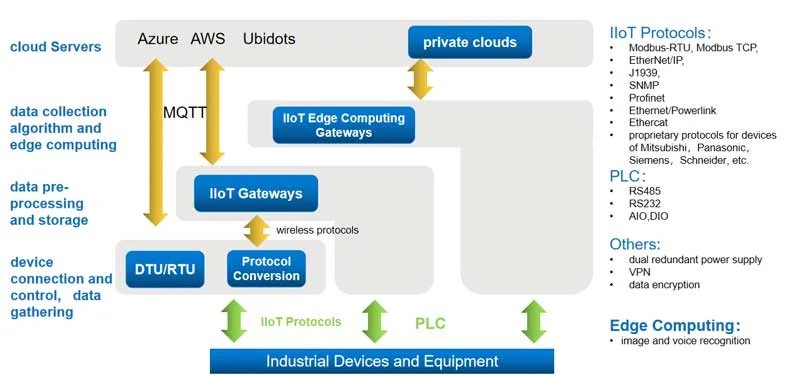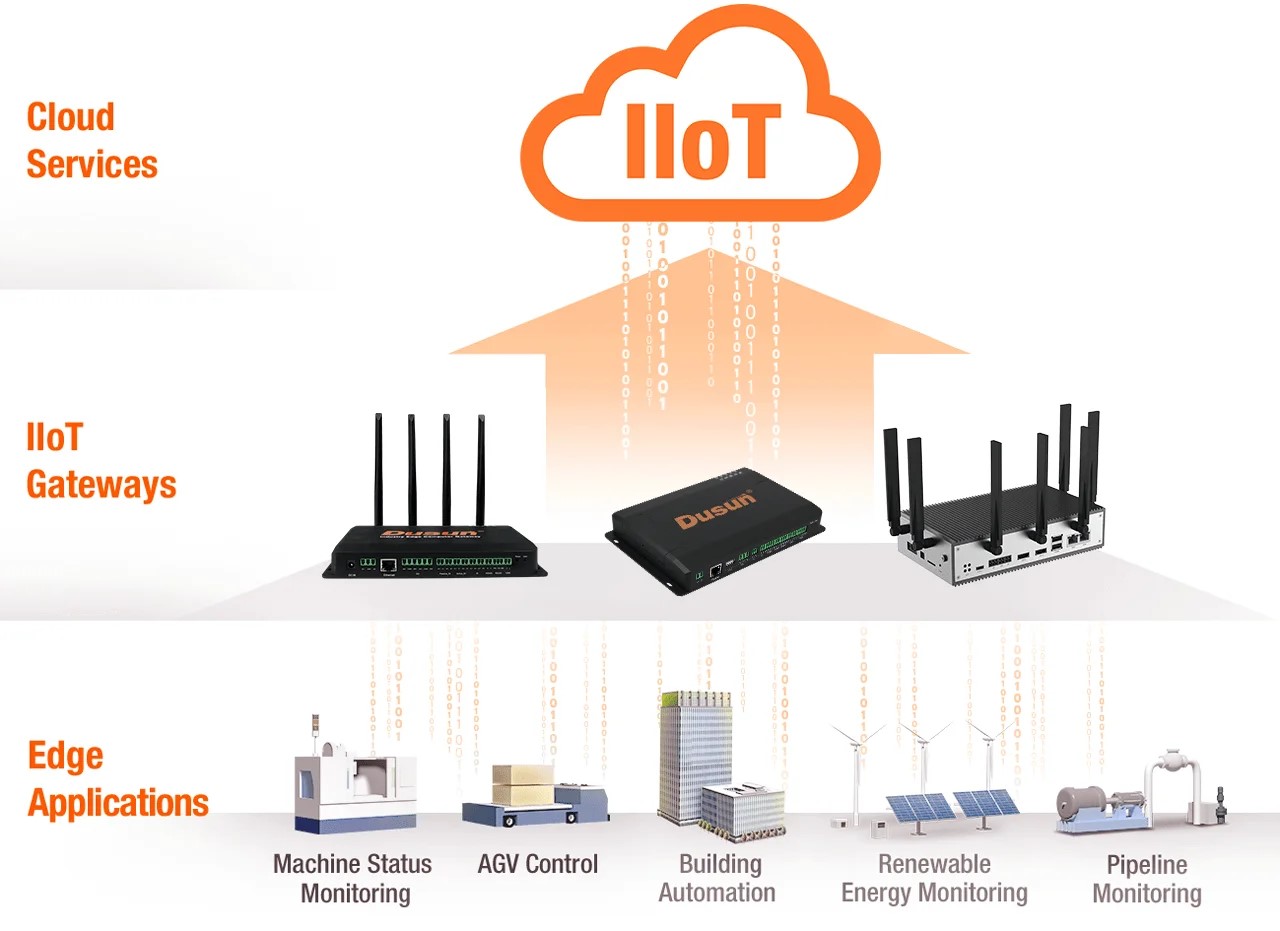In the world of industrial IoT (IIoT), connectivity plays a crucial role in enabling seamless communication between devices and systems. This post aims to compare and contrast three common devices: industrial gateways, DTUs (Data Terminal Units), and industrial routers.
An Industrial Gateway acts as a bridge between different networks, a DTU is specifically designed for remote data transmission, and an Industrial Router focuses on providing secure and reliable connectivity for industrial applications.
In this post, we will explore their shared features, differences, and suitable application scenarios and highlight the benefits of using DusunIoT Industrial Gateway.
Even with access to cleaned and complete datasets, data aggregation mistakes can still occur. One of the biggest reasons for this is the speed of data flows, which can vary significantly depending on storage, access to siloed data, and how data entering data lakes is processed.
Table of Contents
What is Industrial Gateway
An industrial gateway is a versatile device designed to connect various industrial devices and systems to the internet or a private network. It acts as a bridge, facilitating data exchange between different protocols and enabling remote monitoring and control. Industrial gateways often come with multiple connectivity options, such as Ethernet, Wi-Fi, cellular, and serial ports, making them suitable for diverse industrial environments.
It is frequently used on devices on the factory floor, in production equipment, and on sensors close to the edge with the goal of absorbing data generated on the factory floor and transmitting it upstream for additional processing. Industrial gateways can connect systems using a variety of network protocols, just as these edge gateways, and frequently include on-board processing to protect, filter, and manage complicated data flows
Industrial gateways offer support for a wide range of industrial protocols such as Modbus, Profibus, EtherNet/IP, PROFINET, CANopen, and more. This capability allows for seamless integration with various industrial devices, smart sensors, and control systems, regardless of the communication protocols they use. It promotes interoperability and facilitates the exchange of data between disparate systems.

What is DTU (Data Terminal Unit)
A DTU, also known as a Data Terminal Unit, is primarily used for remote data transmission. It is commonly employed in applications where data needs to be transmitted over long distances, such as in remote monitoring or SCADA (Supervisory Control and Data Acquisition) systems. DTUs typically utilize cellular networks to transmit data and are designed to be compact and energy-efficient.
What is Industrial Router
An industrial router is a networking device that provides connectivity between local area networks (LANs) and wide area networks (WANs). It is primarily used to route data packets between different networks, ensuring efficient and secure communication. Industrial routers often come with advanced features like VPN (Virtual Private Network) support, firewall capabilities, and redundancy options to ensure reliable and secure data transmission.
Similarities of Industrial Gateway & DTU & Industrial Router
Industrial gateways, DTUs, and industrial routers share similarities in terms of providing connectivity, facilitating data transmission, being suitable for industrial environments, and supporting multiple communication protocols. These similarities make them essential components in industrial applications, enabling efficient and reliable communication and data exchange in industrial settings.
- Connectivity: All three devices offer connectivity options to establish communication between industrial devices and networks.
- Data Transmission: They facilitate the transmission of data, enabling remote monitoring, control, and data exchange.
- Industrial Environment: These devices are designed to withstand harsh industrial environments, including extreme temperatures, humidity, and vibrations.
- Protocol Support: They often support various communication protocols, such as Modbus, MQTT, and OPC UA, ensuring compatibility with diverse industrial systems.
Differences of Industrial Gateway vs DTU vs Industrial Router
The differences between industrial gateways, DTUs, and industrial routers lie in their functionality, connectivity options, data transmission distance, security features, data processing capabilities, network topology, power supply options, and scalability. These differences make each device suitable for specific industrial applications and environments, catering to different connectivity, data transmission, and processing requirements.
- Functionality: Industrial gateways act as IoT bridges and protocol conversion gateway, enabling data aggregation and exchange. DTUs focus on remote data transmission, while industrial routers primarily route data packets between networks.
- Connectivity Options: Industrial gateways offer a wider range of connectivity options, including Ethernet, Wi-Fi, cellular, and serial ports. DTUs primarily rely on cellular networks, and industrial routers focus on LAN-to-WAN connectivity.
- Data Transmission Distance: DTUs are specifically designed for long-distance data transmission, making them suitable for remote monitoring applications. Industrial gateways and routers are typically used for local or regional connectivity.
- Security Features: Industrial routers often provide advanced security features like VPN support and firewall capabilities. Industrial gateways and DTUs may have limited security features.
- Data Processing Capabilities: Industrial gateways often possess more advanced data processing capabilities compared to DTUs and industrial routers. They can perform data filtering, analysis, and local decision-making, reducing the need for constant communication with the central server.
- Network Topology: Industrial routers are commonly used in scenarios where multiple networks need to be interconnected, such as creating a secure VPN tunnel between different industrial sites. Industrial gateways and DTUs are typically used in point-to-point or point-to-multipoint communication scenarios
- Power Supply Options: DTUs are designed to operate with low power consumption, often utilizing battery or solar power sources. Industrial gateways and routers, on the other hand, are typically powered by AC or DC power sources, allowing for continuous operation in industrial environments.
- Scalability: Industrial gateways and routers are generally more scalable than DTUs. They can handle a larger number of connected devices and support more extensive network configurations, making them suitable for larger-scale IIoT deployments.
Application Scenarios of Industrial Gateway & DTU & Industrial Router

- Industrial Gateway: Industrial gateways are ideal for applications that require protocol conversion, data aggregation, and integration of diverse industrial devices and systems. They are commonly used in smart factories, building automation, and industrial control systems.
- DTU (Data Terminal Unit): DTUs are well-suited for applications that require remote data transmission over long distances, such as oil and gas monitoring, environmental monitoring, and remote asset management.
- Industrial Router: Industrial routers are commonly used in scenarios where LAN-to-WAN connectivity is essential, such as connecting multiple industrial sites, remote access to industrial networks, and secure data transmission between different networks.
In summary, industrial gateways are ideal for integrating diverse industrial devices and systems, DTUs are well-suited for remote data transmission over long distances, and industrial routers are commonly used for LAN-to-WAN connectivity and secure data transmission. Each device has specific applications where its features and capabilities are best utilized, contributing to efficient and reliable operations in various industrial sectors.
Conclusion:
By considering additional factors and insights from the referenced articles, we have gained a more comprehensive understanding of the differences between industrial gateways, DTUs, and industrial routers. Each device serves specific purposes and excels in different application scenarios within the industrial IoT landscape.
In summary, DTUs are specialized devices for remote data acquisition and transmission, industrial routers are used for network connectivity and management, and industrial gateways facilitate communication between different networks or protocols in industrial environments.
When selecting the right device, it is essential to consider factors such as data processing capabilities, network topology, power supply options, scalability, and the specific requirements of your application. Dusun IoT Industrial Gateway stands out as a versatile and reliable solution. With its extensive connectivity options, robust performance, and advanced security features, DusunIoT Industrial Gateway is an excellent choice for industrial IoT applications.





